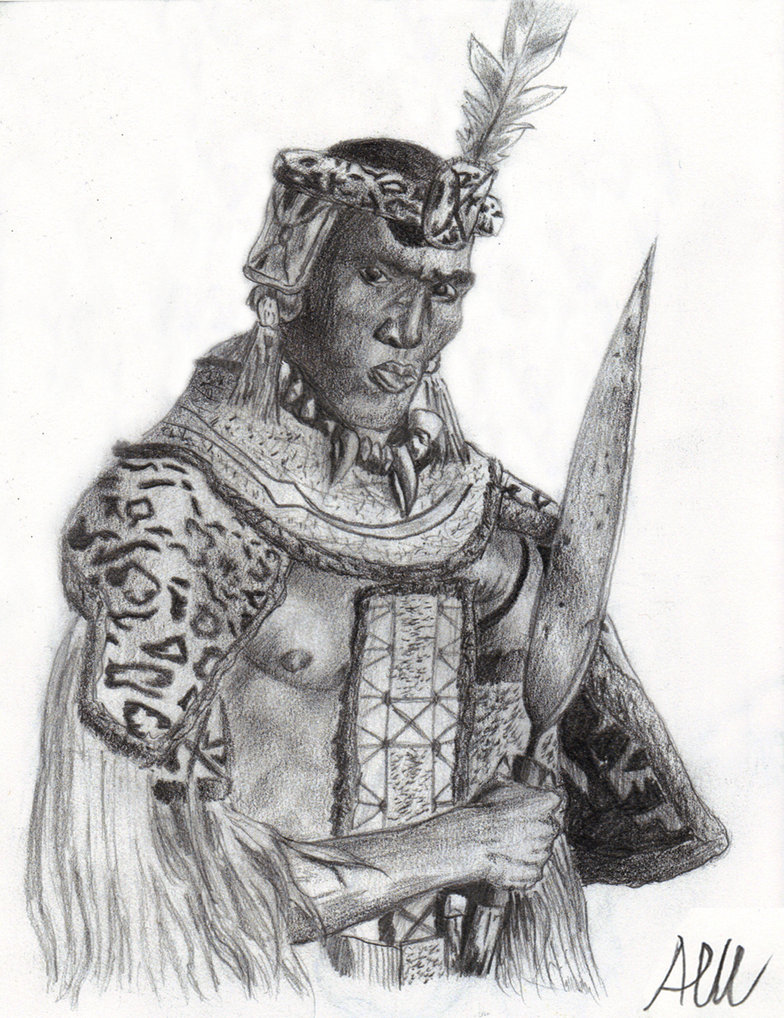Few kings of any culture have matched the rise and accomplishment of Shaka Zulu, the founder of the modern Zulu kingdom in South Africa
For his relatively short life of roughly 41 years, Shaka Zulu united many of the Nguni people of the north and incorporated the Mtetwa Paramountcy and the Ndwandwe into his kingdom.
His holdings expanded from the Phongolo to the Mzimkhulu Rivers and his overall vision and statesmanship led him to become one of the most respected kings during the early part of the 19th century. Shaka played a major role in South Africa history.
The precise date and even year that Shaka was born is uncertain, being conceived out of wedlock by his mother Nandi and his father, the reigning chief Sensangakhona sometime between 1781 and 1787.
He spent his early years growing up with his mother at her settlement until he was old enough to become a warrior under the local chieftain Dingiswayo.
For over a decade Shaka served with bravery, but hardly any notable distinction while learning from Dingiswayo and his new military tactics he was developing.
While his predecessor used the military merely as a means of raiding and political influence, Shaka would seize upon these advances for his own use when he became ruler of the Zulu tribe.
Successful Military Victories
Shaka Zulu was not a figure free of controversy however. While his reign was marked by uniting various tribes under his leadership and obtaining striking military victories which expanded his empire, he also ruled brutally over his people.
Yet for all his flaws, it remains true that Shaka Zulu was the warrior king who changed the tapestry of tribal kingdoms and to this day has remained a powerful influence on his people and those who live in South Africa.

It was during this time that the Portuguese were coming into Zulu territory and Shaka welcomed them, although he did not learn or adapt to their advanced military weapons. Nor did he consider Europeans in a regard higher than his own, perhaps a natural reaction to the slavery issues of the time.
Shaka believed that Zulus were far superior and set out on a course to expand his own holdings once he had the opportunity.
Expansion of Power and Conflict
That opportunity came at the death of his father, Senzangakona in 1816. Aided by Dingiswayo, Shaka defeated his brother and assumed power.
From this point, Shaka began to coerce the neighboring tribes to join the Zulus into one powerful nation that lasted for several years. However, the death of his ally, Dingiswayo led Shaka to become more pronounced with his military strategy and change the Zulus into the warrior mindset that when combined with his powerful use of new tactics led to the Zulus in South Africa to quickly become a real force in the region.

The power of Shaka was centered in his military might, either coercing rivals to join the Zulu nation or smashing them on the battlefield. While Shaka did reward those who joined his kingdom, such as the Mkhize, Sithole and Thuli, the Qwabe peoples were actually incorporated more deeply into the Zulu tribe, even suggesting that they were very closely related.
The greatest rival to the Zulus at the time were the Ndwandwe clan who were quite powerful. After building his forces, Shaka then set up a defensive position at Gqokli Hill. During the battle, Shaka’s forces were assaulted, but held strong and the Zulus won when Shaka sent elephants to sweep behind the Ndwandwe forces which caused them to break. This was the first time on a major scale that Shaka Zulu used the encirclement tactics that became his trademark.
Creator of “Bull-Horn” Strategy
Shaka is generally credited with either inventing or at least making the “buffalo horns” military formation prominent in Zulu tactics. The basics of which consist of three parts.

The “head” of the buffalo where the bulk of the forces were centered, the “horns” which flanked out from the head and consisted of his youngest and fastest soldiers and finally the “loins” which was a reserve group behind the head and sealed any holes in the lines. This relatively simple tactic won Shaka many victories in his lifetime.
The final battle against the Ndwandwe people took place along the Mhlatuze River where the tribe was soundly defeated. While their leader, Zwinde, escaped only to die of mysterious circumstances a short time later, the Ndwandwe were no longer a threat to Shaka Zulu until several years later when Zwinde’s son Sikhunyane battled Shaka in 1826.
Shaka Zulu Expands His Empire

For the rest of his life, Shaka used his military might to both smash any opposition and impress his rivals to join his cause, even through patronage by supporting other tribes. It was during this time that Shaka fought several battles in a civil war to finally unite the Zulus and expand his empire.
Shaka’s assassination was preceded by his bizarre behavior when his mother died. His actions combined with the lust for power of his rivals led to Shaka being killed in 1828, ending the reign of one of the most influential figures in modern South African history.
– See more at: http://www.cape-town-guide.com/shaka-zulu.html#sthash.KJFAewfi.dpuf







